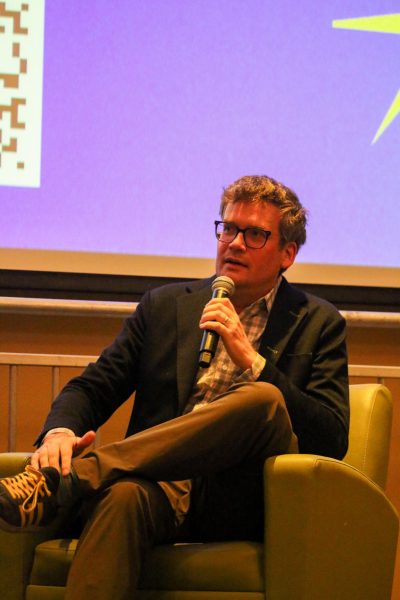Before captivating a packed audience of Saint Louis University students on Sept. 24, bestselling author John Green discussed his approach to writing, the intersection of storytelling and advocacy and how his own experiences have shaped the narratives his readers love.
Known for his deep exploration of human emotions in young adult (YA) literature, Green shared how his personal growth has shaped both his creative process and his perspective on social change. Green’s relationship with writing has transformed over the years. Early in his career, his stories were often closely tied to his personal experiences, but as his life has progressed, he has gained a more nuanced understanding of how those experiences impact others.
“You become more self-conscious, you become more self-aware,” Green said of his years of experience in the publishing world. “I am more protective of my life and the people in my life than I used to be as a writer. I used to think if it’s a good story, it’s going in the book, and if that hurts people’s feelings, such is life. Now, I think pretty differently about that stuff. I value my family a lot more than I value my writing life.”
As he continues to grow as a writer, Green’s work continues to reflect a strong sense of hope.
“I think all really true stories are hopeful,” he explained. “I think that despairing stories or hopeless stories don’t tell the whole truth, just as happily-ever-after stories don’t tell the whole truth. I want to write stories that are as honest as I can make them, and that means making them hopeful.”
Green talked about how being a parent has changed the way he writes about families and parental relationships.
“I don’t think I could have written ‘The Fault in Our Stars’ if I hadn’t been a parent to my son, because when my son was born I immediately realized that love is stronger than death,” Green said.

This realization, he said, became central to shaping the hopefulness in his novel about young people facing terminal illness.
“That was essential, not to the plot of the book, but to understanding how the book can be hopeful,” Green said.
Parenthood gave him a new lens through which to view the world — one that allowed him to write about love and grief in a way that was both honest and hopeful.
Despite being a prominent figure in YA fiction, Green is quick to admit that he doesn’t always understand the slang or trends of modern teenagers. However, what he does grasp, and what truly matters to him, is the deeper connection readers have with his characters.
“There’s a deeper kind of identification that’s much more interesting to me. When you connect with someone on a deeper level, in terms of the things they worry about, the way they approach the world, the places they feel stable or unstable,” Green explained. This emotional resonance is something Green believes is universal, transcending age and time.
Green also discussed his writing process, calling it somewhat unconventional. Juggling his career as a content creator on YouTube with his writing, Green admitted that he doesn’t follow a strict routine.
“If I treated it as my only job, I think I would love it less because it’s still an escape for me,” Green said. “I just write when I can and as long as I can, whenever I get the chance.”
At the heart of Green’s message is a belief in the power of storytelling to connect people and foster empathy. He hopes that his readers not only see themselves in his characters but also learn to understand others in new and meaningful ways.
When asked about his role as a social advocate, Green was clear that he doesn’t write books with the intention of sending a specific message. However, he does hope his stories inspire change.
“I want that to be a byproduct of my books. I want that to be something that emerges from them naturally,” Green said. By focusing on telling real stories, Green believes that his work has the potential to truly help others. “If I’m doing my job, then I’m telling a human story. In telling a human story, it humanizes people that are often dehumanized by society.”
